|
De Nederlandse schrijfster Cissy van Marxveldt werd geboren in Oranjewoud op 24 november 1889. Zie ook alle tags voor Cissy van Marxveldt op dit blog.
Uit: Joop ter Heul
“Gisteravond heb ik Julies haar geschuierd, omdat haar arm zo moe was van het tennissen. Ze draagt de knoedel krullen niet meer, omdat Jog ze niet mooi vond. En ze heeft eigenlijk veel te leuk haar, om er zo'n herrie van te maken. Ze doet het nu maar gewoon met een vlecht om haar hoofd en ik zei, toen ik als een razende aan het schuieren was: "Je ziet er veel leuker uit dan vroeger met dat poedelhaar."
"Jog vindt het zo aardig,"zei Julie. "Hij zegt, het staat zo lief."
"Gek,"zei ik, ik had al die dingen nooit bij Jog gezocht. "Julie staarde toen ze zei: "Wie vind je aardiger om te zien. Jog of Herman de Wilde?"
"O, Jog!"zei ik vol vuur. "H. de Wilde heeft helemaal geen gezicht."
"En Lotte zegt, dat het zo mannelijk is,"proestte Julie.
"Phuu,"zei ik, "moet je alleen zijn schouders maar eens zien."
"Lotte is altijd zo mal overdreven,"zei Julie. "Au zeg, je rukt me de haren uit."
"Ja hoor eens,"zei ik, "jij gaat bij Lotte op fuiven en partijtjes, en als ze hier is, dan gaan jullie uit, en je zoent mekaar en al die nonsens, en dan moet je, nu ze aan de Rivièra zit met een blindedarm, niet over haar gaan mieren tegen mij. Da's niet eerlijk."
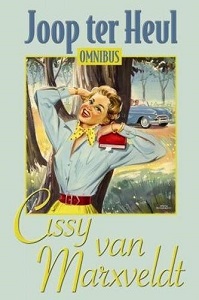
Cissy van Marxveldt (24 november 1889 – 31 oktober 1948)
Cover
De Indiase schrijfster Arundhati Roy werd geboren op 24 november 1961 in Shillong. Zie ook alle tags voor Arundhati Roy op dit blog.
Uit: Come September
“Living as I do, as millions of us do, in the shadow of the nuclear holocaust that the governments of India and Pakistan keep promising their brain-washed citizenry, and in the global neighborhood of the War Against Terror (what President Bush rather biblically calls "The Task That Never Ends"), I find myself thinking a great deal about the relationship between Citizens and the State. In India, those of us who have expressed views on Nuclear Bombs, Big Dams, Corporate Globalization and the rising threat of communal Hindu fascism - views that are at variance with the Indian Government's - are branded 'anti- national.' While this accusation doesn't fill me with indignation, it's not an accurate description of what I do or how I think. Because an 'anti-national' is a person who is against his or her own nation and, by inference, is pro some other one. But it isn't necessary to be 'anti-national' to be deeply suspicious of all nationalism, to be anti-nationalism. Nationalism of one kind or another was the cause of most of the genocide of the twentieth century. Flags are bits of colored cloth that governments use first to shrink-wrap people's brains and then as ceremonial shrouds to bury the dead. [Applause] When independent- thinking people (and here I do not include the corporate media) begin to rally under flags, when writers, painters, musicians, film makers suspend their judgment and blindly yoke their art to the service of the "Nation," it's time for all of us to sit up and worry.”
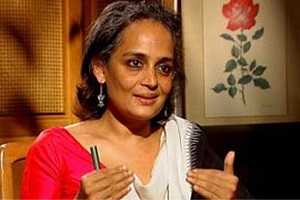
Arundhati Roy (Shillong, 24 november 1961)
De Amerikaanse schrijver Thomas Kohnstamm werd geboren in Seattle, Washington op 24 november 1975. Zie ook alle tags voor Thomas Kohnstamm op dit blog.
Uit: Do Travel Writers Go to Hell?
“Once--maybe when I was first out of school--this opportunity would have been a dream job. It is still seductive, but more along the lines of a cheap one-night-stand. My life is fulfilling in other ways now. I have a steady job, a decent income, a beautiful girlfriend, and an apartment in Manhattan. I finally have everything that I am supposed to have. Besides, between 9/11, SARS, Iraq, Bali, and Madrid, it can't possibly be a good time to dive headfirst into travel writing. But I won't I lie: I have always been a sucker for a cheap one-night-stand.
God knows, I can already feel myself coming up too fast.
For most people, November 24 is not a special day. Sure, it hosts Thanksgiving every few years, but I could care less about that. In Seattle, where few things out-of-the-ordinary ever happen and where people strive, often pathologically, to maintain a facade of tranquility, the day has a different significance.
On November 24, 1971, a balding, middle-aged man boarded a flight from Portland to Seattle. He used the name Dan Cooper. He dressed in a black suit, a black overcoat, black sunglasses, and a narrow black tie with a pearl stick pin. Cooper hijacked the Boeing 727 with a briefcase full of wires and bright red cylinders. The hostages were exchanged for four parachutes and two hundred thousand dollars at Sea-Tac Airport (to put that in perspective, the average cost of a new home in the U.S. in 1971 was $28,000).
DB Cooper, as the press mistakenly dubbed him, demanded to be flown to Mexico. He parachuted out of the plane somewhere over southern Washington State and disappeared. Maybe DB died in the jump. Maybe he got away with the money. Nobody knows. But legend has it that DB was a man so disenchanted with his life that he gambled it all on a way out. The point isn't whether he made it or not. The point is that this little bald man didn't spend one more day pumping gas in Tallahassee or adjusting claims in Denver. He didn't waste one more day wondering, "What if?"
I nominate Cooper as the patron saint of disillusioned men, particularly those who, like me, were born in Seattle on November 24.”
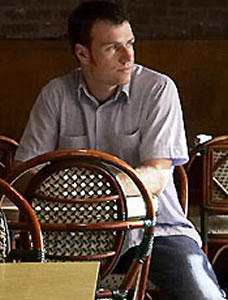
Thomas Kohnstamm (Seattle, 24 november 1975)
De Italiaanse schrijver Carlo Collodi werd als Carlo Lorenzi op 24 november 1826 in Florence geboren. Zie ook alle tags voor Carlo Corrodi op dit blog.
Uit: Pinocchio (Vertaald door Carol Della Chiesa)
“Centuries ago there lived--
"A king!" my little readers will say immediately.
No, children, you are mistaken. Once upon a time there was a piece of wood. It was not an expensive piece of wood. Far from it. Just a common block of firewood, one of those thick, solid logs that are put on the fire in winter to make cold rooms cozy and warm.
I do not know how this really happened, yet the fact remains that one fine day this piece of wood found itself in the shop of an old carpenter. His real name was Mastro Antonio, but everyone called him Mastro Cherry, for the tip of his nose was so round and red and shiny that it looked like a ripe cherry.
As soon as he saw that piece of wood, Mastro Cherry was filled with joy. Rubbing his hands together happily, he mumbled half to himself:
"This has come in the nick of time. I shall use it to make the leg of a table."
He grasped the hatchet quickly to peel off the bark and shape the wood. But as he was about to give it the first blow, he stood still with arm uplifted, for he had heard a wee, little voice say in a beseeching tone: "Please be careful! Do not hit me so hard!"
What a look of surprise shone on Mastro Cherry's face! His funny face became still funnier.
He turned frightened eyes about the room to find out where that wee, little voice had come from and he saw no one! He looked under the bench--no one! He peeped inside the closet--no one! He searched among the shavings-- no one! He opened the door to look up and down the street--and still no one!
"Oh, I see!" he then said, laughing and scratching his Wig. "It can easily be seen that I only thought I heard the tiny voice say the words! Well, well--to work once more."
He struck a most solemn blow upon the piece of wood.
"Oh, oh! You hurt!" cried the same far-away little voice.”
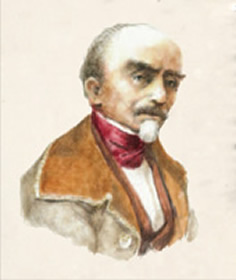
Carlo Collodi (24 november 1826 – 26 oktober 1890)
De Duitse schrijver Gerhard Bengsch werd geboren op 24 november 1928 in Berlijn. Zie ook alle tags voor Gerhard Bengsch op dit blog.
Uit: Der Colonel von Cattenberg
„In der nächsten Viertelstunde unterhielten wir uns über den Rinderwahnsinn, das Waldsterben und die Unfälle auf der Autobahn. Hätte sie mitzureden, sagte Jutta, würde sie den Lastwagenfahrern das Überholen auf der Autobahn verbieten. Sie schwärmte von ihrem japanischen Sportwagen, der vierzig Pferdestärken weniger habe als Brunos Sechszylinder-Peugeot und trotzdem fast genauso schnell sei.
"Oder nicht, Bruno?"
Bruno bestätigte es und tätschelte ihren Arm.
Und dann knirschte der Kies auf der Zufahrt, ein dumpf dröhnender Motor wurde abgestellt, eine Autotür klappte. "Hasselbach", rief Bruno aus. Er verließ die Terrasse, um seinen Kompagnon zu begrüßen.
Die Partnerschaft mit Hasselbach sei für Bruno ein Glücksfall gewesen, sagte Jutta. "Wir hatten doch im Osten zuerst alle keine Ahnung, wie das so läuft, wenn man sich um alles selber kümmern muss. Wie wird eine Gesellschaft mit beschränkter Haftung gegründet, wie kommt man ins Handelsregister, welche Sicherheiten braucht die Bank für einen Kredit, wie muss ein Antrag auf Fördermittel aussehen - hättet ihr das gewusst?"
"Natürlich nicht", gab Annabella zu. "Unter dieser Bildungslücke leide ich entsetzlich."
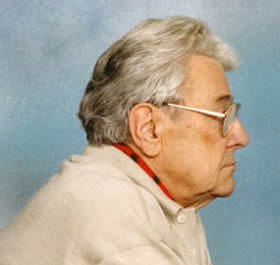
Gerhard Bengsch (24 november 1928 – 11 maart 2004)
De Duitse dichter, schrijver, bibliothecaris en archibaris Ludwig Bechstein werd geboren op 24 november 1801 in Weimar. Zie ook alle tags voor Ludwig Bechstein op dit blog.
Uit: Rheinsagen (Vom deutschen Rheinstrom)
„Heilige Wasser rinnen von Himmelsbergen – singt die Edda, das uralte Götterlied. So auch der Rhein, des deutschen Vaterlandes heiliger Strom, rinnt vom Gottesberge (St. Gotthard), aus dem Schoße der Alpen, nieder als Strom des Segens. Durch Hohenrhätiens Alpentalschluchten stürzt er sich mit jugendlichem Ungestüm, frei und ungebunden, umwohnt von einem freien Bergvolke, das in Vorzeittagen hartlastende, schwerdrückende Fesseln brach.
Einst zwang ein Kastellan auf der Bärenburg die Bauern, mit den Schweinen aus einem Troge zu essen; ein anderer in Fardün trieb ihnen weidende Herden in die Saat; andere übten noch andere Frevel. Da traten Hohenrhätiens Männer zusammen, Alte mit grauen Bärten, und hielten Rat im Nachtgrauen unter den grauen Alpen. Auf einer felsenumwallten Wiese ohnfern Tavanasa will man noch Nägel in den Felsenritzen erblicken, an welche die Grauen, die Dorfältesten, ihre Brotsäcke hingen. Und dann tagten sie in Bruns vor der St. Annenkapelle unter freiem Himmel, nach der Väter Sitte, und beschwuren den Bund, der dem alten Lande den neuen Namen gab, den Namen Graubünden, und daß der Bund bestehen solle, solange Grund und Grat steht. Davon gehen im Bündnerlande noch alte Lieder.”
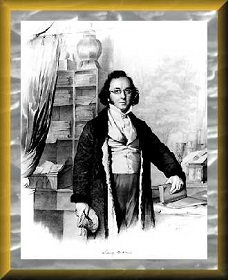
Ludwig Bechstein (24 november 1801 – 14 mei 1860)
24-11-2013 om 12:50
geschreven door Romenu 
Tags:Cissy van Marxveldt, Arundhati Roy, Thomas Kohnstamm, Carlo Collodi, Ludwig Bechstein, Gerhard Bengsch, Romenu
|

